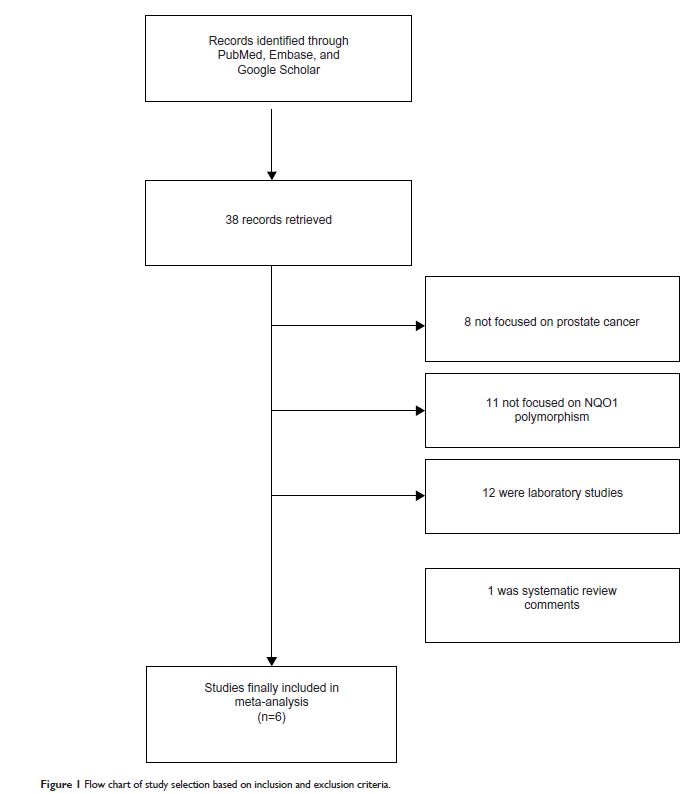108605
论文已发表
注册即可获取德孚的最新动态
IF 收录期刊
- 3.4 Breast Cancer (Dove Med Press)
- 3.2 Clin Epidemiol
- 2.6 Cancer Manag Res
- 2.9 Infect Drug Resist
- 3.7 Clin Interv Aging
- 5.1 Drug Des Dev Ther
- 3.1 Int J Chronic Obstr
- 6.6 Int J Nanomed
- 2.6 Int J Women's Health
- 2.9 Neuropsych Dis Treat
- 2.8 OncoTargets Ther
- 2.0 Patient Prefer Adher
- 2.2 Ther Clin Risk Manag
- 2.5 J Pain Res
- 3.0 Diabet Metab Synd Ob
- 3.2 Psychol Res Behav Ma
- 3.4 Nat Sci Sleep
- 1.8 Pharmgenomics Pers Med
- 2.0 Risk Manag Healthc Policy
- 4.1 J Inflamm Res
- 2.0 Int J Gen Med
- 3.4 J Hepatocell Carcinoma
- 3.0 J Asthma Allergy
- 2.2 Clin Cosmet Investig Dermatol
- 2.4 J Multidiscip Healthc

已发表论文
NQO1 C609T 多态性对前列腺癌的风险的影响:一项荟萃分析
Authors Zhang Q, Zheng M, Qi XL, Liu F, Mao ZJ, Zhang DH
Published Date June 2014 Volume 2014:7 Pages 907—914
DOI http://dx.doi.org/10.2147/OTT.S62046
Received 6 February 2014, Accepted 6 April 2014, Published 5 June 2014
Background: Some studies have found that the NAD(P)H:quinone oxidoreductase 1 (NQO1) SNP609 is associated with an increased risk for several malignancies. Numerous epidemiological studies have evaluated the association between the NQO1 C609T polymorphism and the risk of prostate cancer. However, the results of these studies have been conflicting. The aim of this study was to provide a more precise estimation of its relationship with prostate cancer using a meta-analysis.
Methods: Electronic searches of several databases were conducted for all publications on the association between the NQO1 C609T polymorphism and prostate cancer before May 2013. The odds ratio (OR) and its 95% confidence interval (CI) were used for statistical analysis.
Results: A total of six studies with 717 cases and 1,794 controls were included. No significant association was found between the NQO1 C609T polymorphism and prostate cancer risk in the total population analysis. In subgroup meta-analysis by ethnicity, a positive association was found in an Asian subgroup (T versus C, OR 1.337, 95% CI 1.014–1.763, P =0.040; TT + CT versus CC, OR 1.419, 95% CI 1.053–1.913, P =0.021). However, no significant association in any genetic models was observed in Caucasians.
Conclusion: This meta-analysis showed that the NQO1 SNP609 T allele might be a risk factor for prostate cancer in Asians. However, this result should be verified by additional population-based studies with large sample sizes.
Keywords: NQO1 , SNP609, polymorphism, prostate cancer
Methods: Electronic searches of several databases were conducted for all publications on the association between the NQO1 C609T polymorphism and prostate cancer before May 2013. The odds ratio (OR) and its 95% confidence interval (CI) were used for statistical analysis.
Results: A total of six studies with 717 cases and 1,794 controls were included. No significant association was found between the NQO1 C609T polymorphism and prostate cancer risk in the total population analysis. In subgroup meta-analysis by ethnicity, a positive association was found in an Asian subgroup (T versus C, OR 1.337, 95% CI 1.014–1.763, P =0.040; TT + CT versus CC, OR 1.419, 95% CI 1.053–1.913, P =0.021). However, no significant association in any genetic models was observed in Caucasians.
Conclusion: This meta-analysis showed that the NQO1 SNP609 T allele might be a risk factor for prostate cancer in Asians. However, this result should be verified by additional population-based studies with large sample sizes.
Keywords: NQO1 , SNP609, polymorphism, prostate cancer
